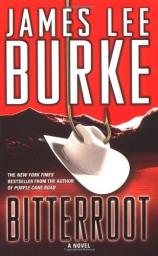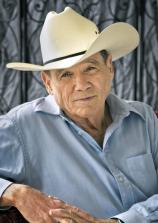Bitterroot
Review
Bitterroot
There has been a lot of ink spilled lately over James Lee Burke and
the David Robicheaux/Billy Bob Holland conundrum. Burke has seen
fit to create two ongoing series featuring primary characters with
more parallels than not: both are ex-law enforcement officers, both
are haunted by the ghosts of past actions (literally, in Holland's
case), and both are a lightning rod for righteous violence despite
their best efforts to avoid it. The issue that seems to enmesh many
critics is why create a character --- Holland --- almost identical
to that of an already existing one --- Robicheaux --- who is quite
popular in his own right?
There are several potential answers to this. One sidereal one is
that the similarities between the two characters might not be so
marked if Burke's perspective, his voice, were not so distinctive
and strong. No one right now is writing quite like Burke; his turns
of phrase, always magnificent, continue to dazzle page by page, if
not paragraph by paragraph. His power of description of nature and
background and, yes, of violent acts and the people who commit them
appears to be indelible in American literature. Is it any wonder,
then, that his protagonists blur around the edges and then some?
And in the ultimate analysis, so what? If by such distinctions he
keeps his writing at such levels as demonstrated in BITTERROOT,
should we not welcome a new Holland book, rather than bemoan
Holland's similarities to Robicheaux?
BITTERROOT finds Holland in Missoula, Montana at the invitation of
his friend Doc Voss, a haunted Vietnam veteran who appears to have
made a lasting, if uneasy, peace with himself and his past actions.
Holland intends to spend an idyllic three months fishing amidst the
beauty of the Montana landscape but soon finds himself embroiled in
trouble involving not only his old friend but also himself. Voss
has become involved in a protest over mining rights, while
Holland's difficulties are a psychotic package of roiling trouble
named Wyatt Dixon. Dixon, a recently released parolee with a
mountain-sized grudge against Holland, has shown up in Missoula,
supposedly accidentally, while working as a rodeo clown. He begins
dogging Holland's footsteps, probing the perimeters of those whom
Holland loves, making his presence known and his threats and
intentions all too clear. Holland, in the meantime, is complicating
his own life by becoming involved with Cleo Lonnigan, a woman with
a history that includes murder and the mob, and a present that
includes involvement with Holland's friend Voss. Holland's poor
judgment in this regard comes to haunt him when his son, Lucas, and
Temple, his investigator and erstwhile lover, come to Missoula
uninvited by Holland but at Voss's request when Voss, unexpectedly,
is accused of murder. Holland suddenly has more people to protect,
and Dixon has more targets --- and the circles Dixon makes around
his prey are becoming smaller and smaller.
Some of Burke's best descriptive writing can be found in
BITTERROOT. Burke knows the Missoula area well; he resides there
during part of the year, and the passages describing his
environment are written with a love and reverence for the land. The
climax of BITTERROOT leaves open the possibility that future
Holland novels will be set there, as opposed to Texas; it is even
possible that Burke is setting up a novel involving an encounter
between Robicheaux and Holland, given that Robicheaux is no
stranger to that area himself. No matter what Burke decides to do,
however, with Billy Bob Holland, the results will no doubt be
worthy of reading.
Reviewed by Joe Hartlaub on January 21, 2011





